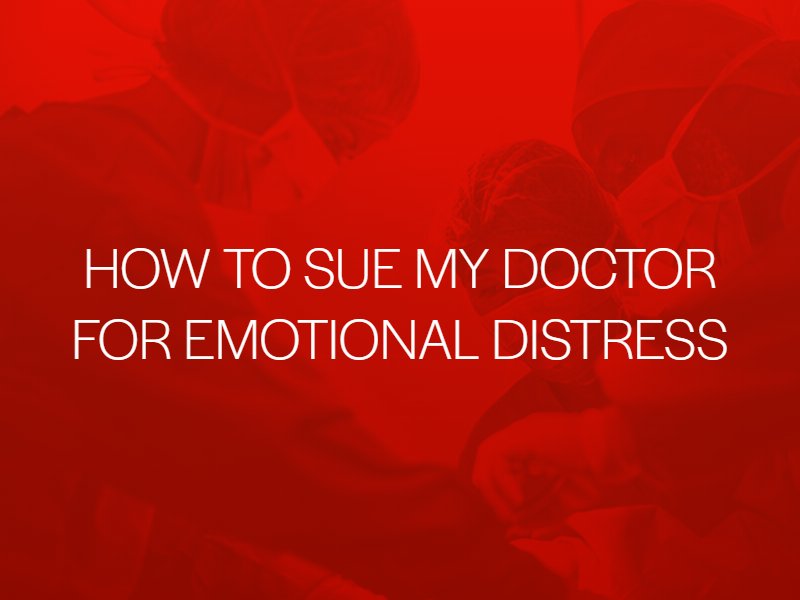When it comes to the intricate relationship between patient and physician, an unsettling query often surfaces: “Can I sue my doctor for emotional distress?” It’s a question that might just swirl around in your mind, especially after an experience that left you feeling more vulnerable than empowered. But before you dive into the labyrinth of legal jargon, let’s dissect this multifaceted topic in a way that’s digestible and relatable.
First off, let’s set the stage. Imagine you visit your doctor seeking help for a chronic issue. You trust them with your health, your worries, your emotional state. However, instead of receiving the empathetic care you were expecting, you leave feeling belittled or unheard. Perhaps there was negligence involved, or maybe the conversation just didn’t sit right. This leads us to our central theme: emotional distress. What does it entail, and in what scenarios can you consider seeking legal recourse?
Emotional distress, in legal parlance, typically refers to mental suffering or anguish stemming from the actions or negligence of another party. In the context of healthcare, this could arise from various situations, such as misdiagnosis, inappropriate treatment, or, in some instances, outright malpractice. The fundamental question many patients grapple with is not merely about whether distress was caused, but also about whether that distress is compensable in a court of law.
Let’s delve a little deeper into the nuances of suing a doctor for emotional distress. Most jurisdictions uphold that a designated standard of care must be breached for a claim to stand. This brings us to the concept of negligence. A doctor must adhere to the standards accepted in the medical community. So, if a healthcare professional does something that a reasonably competent doctor wouldn’t do, you might have grounds for a lawsuit.
This leads us to the element of emotional distress itself. In order to successfully sue a doctor, plaintiffs typically must establish proof of either intentional infliction of emotional distress (IIED) or negligent infliction of emotional distress (NIED). But what do these legal terms mean in practice?
Intentional infliction of emotional distress requires proving that the doctor’s behavior was not just inappropriate but was also intended to cause distress or was so egregious that it resulted in severe emotional suffering. This could mean that the doctor made inappropriate comments about your condition or failed to treat you adequately after knowing the potential ramifications of their actions.
On the flip side, negligent infliction of emotional distress generally involves care that was conductively careless, leading to suffering. Here’s where things can get even murkier. Most courts require that the emotional distress be accompanied by some form of physical injury or that the claimant was in the “zone of danger”—meaning they were at risk of physical harm themselves. For instance, if a medical error not only leaves you feeling devastated but also led you to develop anxiety or depression, this might fit the criteria. However, proving this can be elusive.
Now, here’s a playful challenge for you: picture yourself in the courtroom, navigating through a sea of legal terms, medical jargon, and emotional testimonies. Would you feel empowered or overwhelmed? Most people might lean toward the latter. Thus, it is crucial to remember that the burden of proof lies with the plaintiff, and gathering substantial evidence—such as medical records, expert testimonies, and documented emotional struggles—can prove to be a Herculean task.
Once the psychological intricacies of emotional distress and legal foundations are established, one must consider another crucial factor: the potential impacts of such a lawsuit on your mental state. Litigation can often be a lengthy, convoluted process fraught with emotional highs and lows. It’s imperative to weigh whether pursuing legal action will ultimately provide the relief you seek or if it will pile on additional burdens.
Moreover, many people find it beneficial to explore alternative avenues before jumping into the formal legal sphere. Engaging in mediation and seeking a resolution outside of court might alleviate some of the stress while still addressing grievances. You may find solace in discussing your experiences with a counselor or therapist, helping to mend the emotional turmoil without winding through the complex court system.
Furthermore, let’s briefly touch on the ethical aspects of pursuing such litigation. Many argue that medical professionals often operate under immense pressure, juggling various responsibilities. A lawsuit may lead to psychological consequences for doctors too. Thus, understanding the broader implications is vital—both for yourself and the larger healthcare community.
In the end, the journey of determining whether to sue a doctor for emotional distress is highly nuanced. It’s essential to evaluate your personal circumstances, your emotional health, and your long-term goals. Enumerating the facts, consulting with legal experts, and perhaps, most importantly, taking care of your mental well-being should all be part of the equation. Ultimately, whether or not legal action is the route for you, know that your feelings—a blend of trust, frustration, and a yearning for compassion—are valid, and addressing them should always be a priority. A journey toward healing doesn’t always have to involve litigation, but it must begin with understanding and self-validation.
